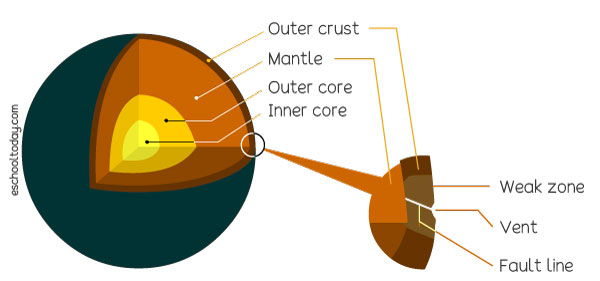- Volcanoes
Why do volcanoes erupt?
Let us start with the make-up of the earth.

The earth has three-layer parts. The outer crust is the layer on which we live. It is estimated to be about 1800 miles deep. Then there is the mantle and then the core (inner and outer core).
The mantle contains molten material and gases. Molten materials are solids (like a rock) that have turned into a liquid because of extreme heat. The name for molten rock and other gases in the earth’s mantle is Magma. Magma is a liquid made up of many crystals, fragments, and gases including oxygen, silicon, iron, aluminum, magnesium, and manganese. When they cool off on the earth’s surface, they turn into magmatic or igneous rocks.
Whenever extreme pressure builds in the mantle, along fault lines (openings or cracks in weak spots in the earth’s crust) an eruption is likely to happen next. During an eruption molten materials (soon to become lava) gush out through spaces in the crust to the surface.
NOTE: Molten rock is called magma when it is inside the crust, but once it gets to the surface of the earth it is called lava.
Eruptions can be in the form of lava fragments shooting into the atmosphere and forming thick clouds of lava. Some flow slowly (non-violent) from the vent, flooding the area around it. The very fine particles of ash may also be discharged high into the stratosphere and further carried away by wind action.
Fresh lava is believed to be about 2,200°F. It can be red hot as it shoots from the vent and turns into grey or black as it cools. Lava rich in silicon is like honey and flows a lot more slowly from the vent. In other types, lava also comes in a thick, pasty form.
